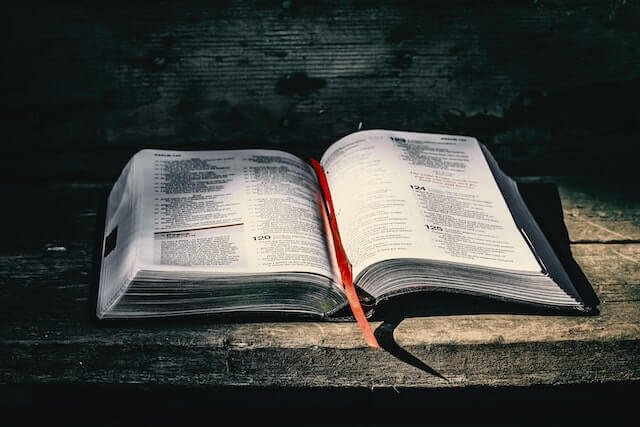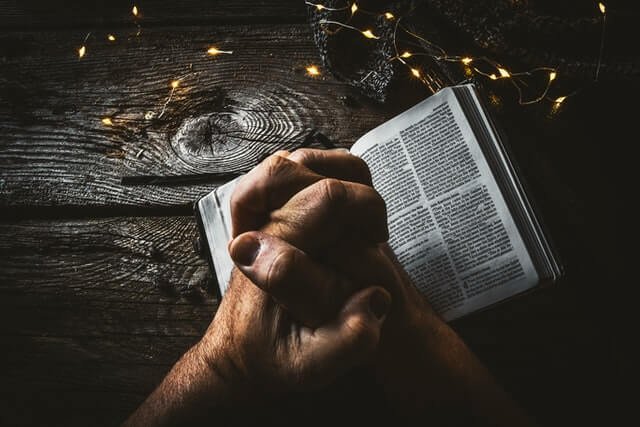Galatians 5:1 (Addiction)
“For freedom Christ has set us free; stand firm therefore, and do not submit again to a yoke of slavery” (Galatians 5:1).
One of the misconceptions about becoming a follower of Jesus is that life will be easy once we make Him Lord and Savior of our lives.
The assumption is that all our fleshly desires will miraculously fade away once the Holy Spirit enters our hearts, and we’ll no longer crave the things which formerly clouded our judgment and manipulated our actions.
The problem is that while the blood of Jesus cleanses us from all unrighteousness (past, present, and future), we still have free will to make decisions and choose the path we'll take at any given moment. In other words, we’re still in control. The only difference (as followers of Christ) is we are held accountable to maintain self-control and not revert to old, sinful patterns.
That is where Galatians 5:1 provides much needed perspective because it reminds us that Christ set us free from the power of sin and death so we could live in freedom, not bondage. Therefore, our identity is found in Him alone, not the destructive pleasures of this world which once enslaved us, nor the scarlet letter of our shameful past either.
“And you were dead in the trespasses and sins in which you once walked, following the course of this world, following the prince of the power of the air, the spirit that is now at work in the sons of disobedience—among whom we all once lived in the passions of our flesh, carrying out the desires of the body and the mind, and were by nature children of wrath, like the rest of mankind” (Ephesians 2:1–3).
However, we are not lifeless robots which are reprogrammable with 100% accuracy. In other words, what we desire with our physical senses still appeals to our flesh, hence we have choices to make every day regarding whom or what we will ultimately serve.
Therefore, we must continue building spiritual disciplines into our lives to guard our hearts and protect our minds from backsliding into addictive patterns which once pledged their allegiance to the idols of this world.
“Addiction is bondage to the rule of a substance, activity, or state of mind, which then becomes the center of life, defending itself from the truth so that even bad consequences don’t bring repentance, and leading to further estrangement from God. To locate it on the theological map, look under sin. More specifically, since sin is a broad category that includes both self-conscious disobedience and victimizing slavery, find addiction on the side that emphasizes slavery.”
HABITUAL SIN:
Addiction is the quintessential epitome of destructive behavior.
“But each person is tempted when he is lured and enticed by his own desire. Then desire when it has conceived gives birth to sin, and sin when it is fully grown brings forth death” (James 1:14–15).
When we think about addiction, we typically attribute it to extreme substance abuse. However, addiction encompasses a wide range of behaviors and activities, both legal and illegal, in varying degrees. The challenge most of us have defining addictive behavior (whether we realize it or not) depends upon how we measure its severity.
If we’re honest with ourselves, our hierarchy of addictive behavior is nothing more than a justification scale heavily weighed against issues we rarely struggle with, as opposed to sins which are common struggles for us daily.
“Do not be conformed to this world, but be transformed by the renewal of your mind, that by testing you may discern what is the will of God, what is good and acceptable and perfect. For by the grace given to me I say to everyone among you not to think of himself more highly than he ought to think, but to think with sober judgment, each according to the measure of faith that God has assigned” (Romans 12:2–3).
For example, most people would place illegal drugs (cocaine, heroin, crystal/meth, etc.) at the top of their list of most destructive behaviors, but where do various, legal substances (alcohol, nicotine, marijuana, steroids, OTC’s, prescription painkillers, etc.) fall on the list?
How do we feel about all forms of gambling, lust, pornography, binge-eating, compulsive shopping, gaming, etc., which consume our time, energy, and resources? Delving even deeper, how many of us struggle repeatedly with anxiety, gossiping, anger, envy, impure thoughts, covetousness, hard-heartedness, complaining, negativity, or discontentment in God’s provision (just to name a few)?
Bottom-line, are we more likely to excuse addictive behaviors which are socially acceptable and may not have immediate consequences, or do we consider all sins equal, regardless of severity, because they isolate us from God’s grace and mercy?
“There are six things that the LORD hates, seven that are an abomination to him: haughty eyes, a lying tongue, and hands that shed innocent blood, a heart that devises wicked plans, feet that make haste to run to evil, a false witness who breathes out lies, and one who sows discord among brothers” (Proverbs 6:16–19).
“Put to death therefore what is earthly in you: sexual immorality, impurity, passion, evil desire, and covetousness, which is idolatry” (Colossians 3:5).
The truth of the matter is we are ALL addicts to one degree or another because addiction is the result of continually yielding to habitual sin which we’re ALL guilty of committing on a regular basis.
Therefore, rather than compartmentalize addicts into their own sin category to justify sins we commit as less grievous in God’s sight, let us own our self-righteousness and repent of our judgment against others, for they are no better or worse off than we are with our fleshly desires.
MISDIAGNOSIS:
One of the most common mistakes we make regarding addiction is misdiagnosing it as a disease rather than a conscious, personal choice. Treating it as a disease merely puts the addict in a victimization mindset which further perpetuates the problem.
Rather, we must own our sins and repent of our volitional choice to replace the sufficiency of Christ with an idol of our choosing. For the longer we compartmentalize our sins from a victim’s mindset, the harder it will be to repent and break free from the chains which bind our hearts.
“For I know my transgressions, and my sin is ever before me. Against you, you only, have I sinned and done what is evil in your sight, so that you may be justified in your words and blameless in your judgment” (Psalm 51:3–4).
“Sin is called sickness, so people think it requires therapy, not repentance. Habitual sin is called addictive or compulsive behavior, and many surmise its solution is medical care rather than moral correction.”
Keep in mind, the enemy wants us to believe our sinful behavior is either not our fault or justified, because he knows that ownership begins the journey toward genuine repentance, and he cannot allow that to happen. He would rather tempt us to blame shift personal responsibility to appease our flesh and deflect attention off what we need to change moving forward.
For if we’re consumed with figuring out who or what influenced our behavior rather than accepting complete accountability for our actions, we’ll be distracted just enough to remain shackled to the stronghold of addiction rather than breaking free from its chains forevermore.
“Whoever conceals his transgressions will not prosper, but he who confesses and forsakes them will obtain mercy” (Proverbs 28:13).
That is why Paul encourages us to “stand firm therefore, and do not submit AGAIN to a yoke of slavery.” For the skeletons of our past will always feel comfortable and familiar no matter how much time passes, which is why we must submit to the absolute truth and authority of God’s Word as our strength in lieu of the desires of our flesh which appeal to our senses.
Make no mistake, a heart which holds onto a personal responsibility “escape clause” is not living in freedom. It is merely planning to fail because it has misdiagnosed its behavioral addiction as a disease rather than a choice.
“Addiction is not like a disease. It is something we do rather than catch, we confess it rather than treat it, the disease is in our hearts rather than our bodies, and only the forgiveness and cleansing found in the blood of the Great Physician is sufficient to bring thorough healing.”
REHABILITATION:
Overcoming addiction is only made possible if we’re willing to relinquish unconditional control of our lives to God and His sovereignty, come what may. That may seem easy to preach on the surface but making amends for sins committed against those we love is completely different.
“The sacrifices of God are a broken spirit; a broken and contrite heart, O God, you will not despise” (Psalm 51:17).
True rehabilitation follows the pattern of Biblical repentance and cycles through (1) mourning our sin, (2) owning the consequences of our actions, (3) confessing our sins to those we’ve hurt, (4) humbly asking for their forgiveness, and (5) restoring our broken relationships by making the necessary changes to sin no more moving forward.
“Jesus stood up and said to her, ‘Woman, where are they? Has no one condemned you?’ She said, ‘No one, Lord.’ And Jesus said, ‘Neither do I condemn you; go, and from now on sin no more’” (John 8:10–11).
But to live free from the shackles of our past, we must allow God to fill the void our sin once held. Otherwise, we will relapse into the same old patterns and revert to sinful behavior which promises peace and comfort, but only enslaves us further.
“When the unclean spirit has gone out of a person, it passes through waterless places seeking rest, and finding none it says, ‘I will return to my house from which I came.’ And when it comes, it finds the house swept and put in order. Then it goes and brings seven other spirits more evil than itself, and they enter and dwell there. And the last state of that person is worse than the first” (Luke 11:24–26).
The biggest obstacle to breaking free from any addiction, though, is truly a matter of faith. “For freedom Christ has set us free,” but do we believe it? At times, God’s Word can feel like nothing more than ink on a page, but what do we do when temptation appeals so strongly to our senses? How do we escape repeating the same mistakes?
RELAPSE:
Those going through rehabilitation already know past addictions serve no present benefit whatsoever, yet many relapse into old, sinful patterns because they begin to minimize their sin and become desensitized to the consequences of their actions.
That is why the only remedy to overcoming addiction comes down to worship. For when we find ourselves at fork in the road decisions and trials of life have us longing to escape reality, the temptation to obey our fleshly cravings feels like the easiest solution. Yet in actuality, it testifies to who or what matters most in our lives.
“There is a way that seems right to a man, but its end is the way to death” (Proverbs 14:12).
It also does us no good in the long run to merely cut off our addiction’s supply line and expect complete victory. Rather, we must mortally wound our enemy to ensure the serpent never tempts us to doubt the absolute truth of God’s Word again.
“But if we walk in the light, as he is in the light, we have fellowship with one another, and the blood of Jesus his Son cleanses us from all sin. If we say we have no sin, we deceive ourselves, and the truth is not in us. If we confess our sins, he is faithful and just to forgive us our sins and to cleanse us from all unrighteousness” (1 John 1:7–9).
If we relapse, though, it does not mean the changes we’ve made have been a waste of time. Building spiritual disciplines takes time, hard work, intentionality, determination, consistency, and patience. Therefore, if we fall, we simply need to confess our sins, repent of our mistakes, and continue walking in the light of Christ.
Satan would have us believe we need to go back to the starting line when we relapse. That is a lie. We simply need to recognize the pattern of our mistakes and continue in our sanctification journey from the point at which we fell.
“There is a remedy revealed for man’s need, as wide and broad and deep as man’s disease. We need not be afraid to look at sin, and study its nature, origin, power, extent, and vileness, if we only look at the same time at the almighty medicine provided for us in the salvation that is in Jesus Christ. Though sin has abounded, grace has much more abounded.”
BOTTOM-LINE:
Addiction does not have to be a scarlet letter we bear publicly. For if we desire to live in freedom, we must remember we’re not defined by our mistakes, but rather by Jesus who died to set us free from sin’s bondage.
“Abide in me, and I in you. As the branch cannot bear fruit by itself, unless it abides in the vine, neither can you, unless you abide in me. I am the vine; you are the branches. Whoever abides in me and I in him, he it is that bears much fruit, for apart from me you can do nothing. If anyone does not abide in me he is thrown away like a branch and withers; and the branches are gathered, thrown into the fire, and burned” (John 15:4–6).
Therefore, rather than wallow in our guilt, shame, and regret, let us allow God to use our stories to bring glory to His name. For public confession of our sins demands a great deal of humility as we expose our vulnerability to others and risk being judged for our past mistakes.
However, if we have been healed, restored, and redeemed by God’s grace and mercy, our story is no longer our own. Our testimony belongs to the Lord, and we are called to trust His sovereignty as He uses our personal stories to minister to others struggling in the same manner.
“Trust in the LORD with all your heart, and do not lean on your own understanding. In all your ways acknowledge him, and he will make straight your paths” (Proverbs 3:5–6).
Make no mistake, our past may not be filled with decisions made that we’re proud of, but God can use them for His glory if we’re willing to lay down our pride, humble ourselves, and walk forward by faith in His sovereign will for our lives.
“Our yesterdays present irreparable things to us; it is true that we have lost opportunities which will never return, but God can transform this destructive anxiety into a constructive thoughtfulness for the future. Let the past sleep, but let it sleep on the bosom of Christ. Leave the Irreparable Past in His hands, and step out into the Irresistible Future with Him.”
NOTE: If you enjoyed this post, check out my new book, “Lord, I’m Tired,” which further expands upon this devotion.






































